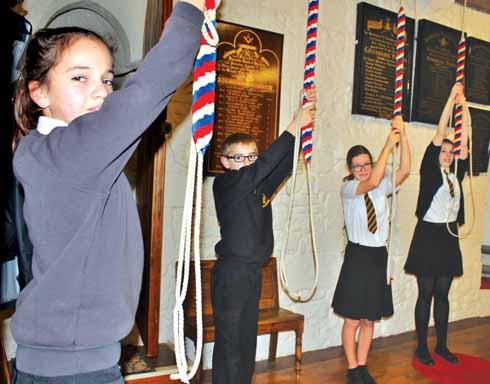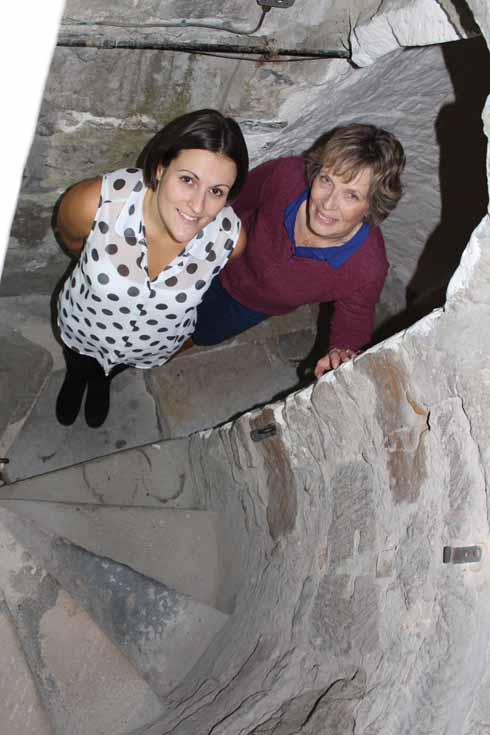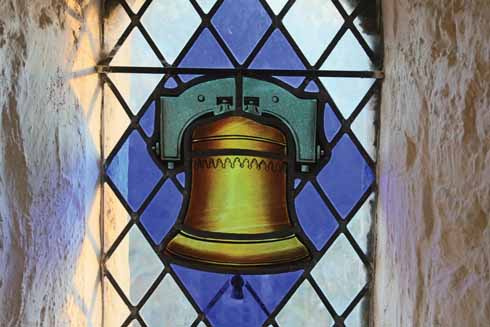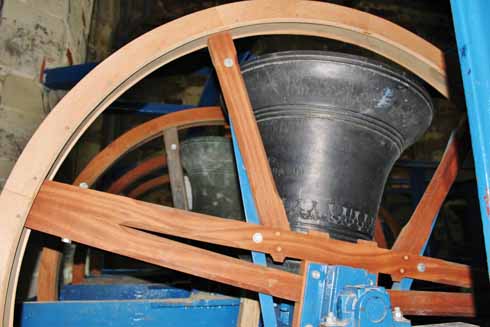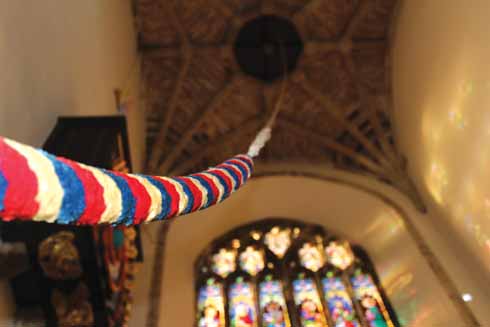Keep ‘em pealed!
Claire Vera learns the ropes with Dorset’s bellringers
Published in February ’17
Have you ever wondered what the loudest musical instrument in the world would sound like? You may be surprised to know that you’ve heard it, often in fact. Most of us take it for granted, but would miss it if it disappeared from the sound of weddings, funerals, occasions of national importance and lazy Sunday mornings. Sadly, many of us no longer hear our church bells as often as we did. And the day may come when they fall silent forever. The shortage of bell ringers in Dorset is worrying. In the Salisbury Diocese there are two hundred and sixty working bell towers. If they all rang out at once they’d need more than fifteen hundred people holding the ropes. Currently in the Diocese there are just over fourteen hundred.
So the call has gone out for new recruits and former bell ringers to return to the towers. Anthony Lovell-Wood is Secretary of The Salisbury Diocesan Guild of Ringers and a member of the Central Council of Church Bell Ringers. He talks excitedly about the health benefits of bell ringing: ‘I don’t think it is any co-incidence that we have people who go on ringing well into old age. It’s obvious that it helps with upper body strength, but it is also extremely good for breathing and is a work-out for your lower legs. Not to mention the cognitive benefits of working as a team while ringing.’
The evidence in Dorset would seem to support the contention; there are many ringers well over the age of 70 and there are two who passed their 100th birthdays, although they stopped ringing in their nineties. There are also encouraging signs of a growing popularity with the younger generation.
Anthony recommended a visit to one of Dorset’s best-loved towers, at beautiful Wimborne Minster. After climbing 72 cold, twisting, stone steps, one arrives at the ringing chamber. Bigger than expected, it has wonderful views through small windows, one of which contained a little green stained glass bell.
Within the chamber is Charlotte Randall, a teacher at Allenbourn Middle School and former childhood bell ringer who has returned to the tower at the request of her own former bell ringing teacher Flick Warwick, Secretary of the Wimborne Bell Ringers. She has brought along four of her charges in order to pass the skills to the next generation. ‘I went to Allenbourn as a pupil and Flick was a youth worker at the time, she came into school and invited us to a taster evening. I spent the next five years ringing, for weddings, Sunday services. I’ve done a couple of quarter peals and I’ve even done one peal at New Year– which was more than three hours long. I then gave up when I went to university. So now, thirteen years later, I’m back for another go.
‘I can still do it, having not touched a rope in more than ten years. And to see how quickly they are picking it up is amazing. I’m thoroughly enjoying it and it’s a great thing for a Friday afternoon, to be able to walk away from work, come up here and enjoy a ring. I’m getting my hand back in and it is great fun teaching,’ she added.
Twelve-year-old Ellie Sharp has only been learning for four months: ‘It was quite hard at the start because it’s not like anything I’ve done before.’
A computer screen shows sound waves of each bell and reproduces the sound, so that the bells can be muffled and the learners can make their mistakes without complaints from the neighbours. The technology looks a little alien inside this ancient room, but it has been there for some twenty years now, saving the people of Wimborne a fortune in cotton wool. Although, with today’s ringers, Wimborne would be more than impressed.
Ellie is about to be part of a service where the bells will ring for everyone to hear and she says she’s not nervous because she’ll forget and think she’s hearing it on the computer still.
Ellie’s friend Ellana Dulson says it’s hard at first but it makes her proud that she’s mastering the skill after such a short time: ‘It hurts a bit at first, but it builds your upper body strength and then it gets better.’ Ellana agrees that it is confidence-building. ‘I’m a bit nervous about playing in a service, because I’ve still got to work on my timing, but I think I’ll be fine,’ she says.
Jess Davies says she mastered the basics in a couple of sessions and she thinks more young people should give it a go: ‘They should try it because it’s really fun and you get to learn something you wouldn’t normally learn and you don’t often get opportunities like this,’ she says.
Max Dennis is the only boy in the class and he agrees: ‘My friends think it’s quite cool and they don’t know anyone else who does it. It’s not very well known any more. It was a completely new thing for me. Nobody in my family does it. Jess said it would be fun if I came along and so I decided to join. It’s really fun and it’s cool to be playing the loudest instrument in the world.’
Teaching the newbies are Wimborne ringers Susan Smith, John Riley and Alan Bentley. John began by telling me about his own involvement in ringing: ‘I started at the age of 17 and I’m now 62’ (a bell ringing youngster) ‘It’s more to do with technique than strength, but it keeps you fit. If your technique is correct you can ring without much strength. Comparatively light people can ring heavy bells.’
Susan began at the age of just eleven and has lived in all parts of the country. She was a member of the bell ringing band at St Martin in the Fields in London. ‘The way I was taught is no different from the way we’re teaching now. It’s very important to hand on our skills because we need to keep the bells ringing. There is a shortage of ringers and we need to make sure this skill is not lost. Some churches have nobody to ring their bells and that’s a great shame. You don’t need to start early either. I have taught a person aged 70. So anyone can come and find out more.’
Alan said: ‘The young people we have been teaching today are improving each time. They only have half an hour a week and we’d like it to be longer, but you can spot the ones who pick it up naturally. It’s not necessary to be musical. If you have rhythm and good hand-eye coordination that’s what helps you to learn faster. But I don’t know of anyone who has given up because they’ve not been able to achieve something.’
Everyone I have spoken to about bell ringing describes it as ‘like riding a bike’ – once you learn the complex patterns, your brain won’t let you forget it. So there is a call for anyone who played in their younger days and is perhaps now retired with some time on their hands, to come back, even if they think they can’t do it. They could be surprised.
‘It’s an historic art,’ said Susan. ‘I’ve been in towers where there are fireplaces in the belfry. Bells are easier to ring these days and it’s a great skill to learn. Lots of people who come are children of ringers and it is a really good activity for families to learn together because all ages and generations can play. The age range brings the community together. The greatest thing about being a ringer is that once you can ring you are welcomed in every church in the world. There is a large world-wide community, including a growing one in Australia,’ she added.
Bell ringing has made a very important difference in Alan’s life. ‘In certain parts of the country there are a lot of young people ringing, because they ring at university, for example Southampton. It’s great for their social life and for networking. I met my wife bell ringing at university. In fact, it’s quite a good matrimonial agency’ said Alan. And of course, you’re guaranteed to get the bells rung at your wedding.
If you are interested in finding out more about bell ringing you can visit your local church to find out about your nearest bell ringing tower. There are a number of online resources including www.bellringing.org, www.learningtheropes.org and the Central Council of Church Bell Ringers www.cccbr.org.uk. There is also plenty of information on the Salisbury Diocesan website’s bell ringing page www.salisbury.anglican.org/worship/music/sdgr
